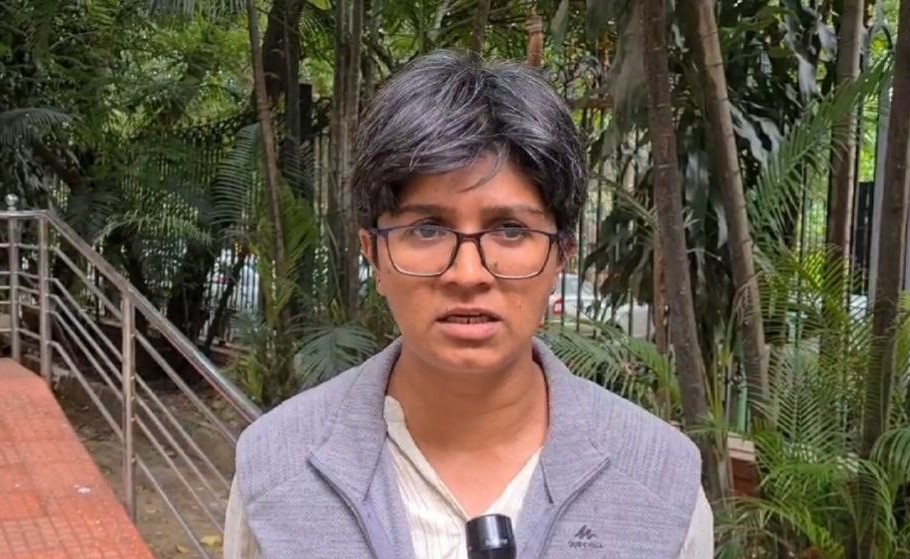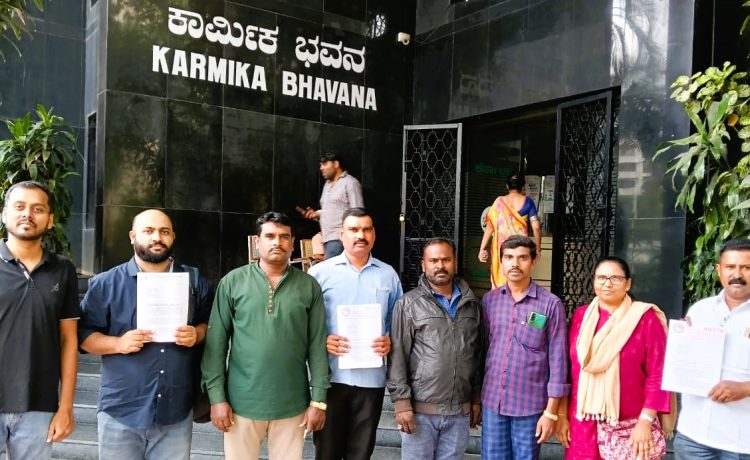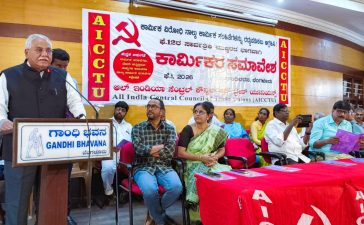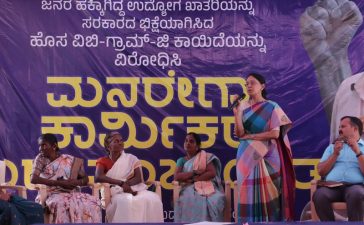AICCTU Challenges Karnataka Labour Department’s Minimum Wage Notification: Calls for Justice, Gender Equity and Retrospective Revision
Bengaluru, June 9, 2025 — The All India Central Council of Trade Unions (AICCTU) has raised serious objections to the recent notification by the Karnataka Labour Secretariat (Notification No. KaE 411 LDW 2023 dated 11.04.2025), citing flaws in wage calculation, gender bias, and discriminatory wage-setting mechanisms. In a strongly worded memorandum submitted to the Labour Secretary and Labour Commissioner, the union has called for a comprehensive revision in the state’s minimum wage structure.
Inadequate Wage Calculations: A Fundamental Flaw
AICCTU argues that the proposed minimum wages are grossly inadequate and do not reflect the actual cost of living in Karnataka. Citing the landmark Supreme Court judgement in Workmen vs. Management of Reptakos Brett & Co. (1992), the union emphasized that minimum wages must account for not just sustenance but also other essential needs such as housing, education, health, and recreation.
“The only reasonable way to determine wages is to evaluate each component in the light of prevailing prices,” the memorandum states.
Consumption Units: From Outdated Models to Realistic Standards
One of the core demands raised by AICCTU is the revision of the consumption unit calculation. The current norm assumes 3.0 units (1.0 for adult male, 0.8 for adult female, and 0.6 for each of two children), which the union deems outdated and discriminatory.
Citing alarming statistics from NFHS-5 and the Department of Women and Child Development, the union calls for an increase to 5.6 units, including 1.0 unit each for both adults, 0.8 for each child, and 2.0 for dependent parents.
“Assigning only 0.8 units to women perpetuates gender bias and institutionalizes sex-based discrimination,” the union notes.
Minimum Wage Calculations Based on Realistic Needs
Using the dietary recommendations of Dr. W.R. Aykroyd and Supreme Court guidelines, AICCTU presented a comprehensive cost breakdown. For Zone 1:
- Food & clothing: ₹14,226.75
- House rent (escalated from 2016): ₹7,996
- Miscellaneous: ₹8082.09 (20%)
- Education, health, recreation: ₹10,102.61 (25%)
Total: ₹40,410.45 per month (for 3.0 units), to be proportionally scaled up for 5.6 units.
Demand for Retrospective Implementation
AICCTU insists that the revised wages should be enforced retrospectively from the date when the last 5-year cycle lapsed. Legal precedents from both the Karnataka and Kerala High Courts support retrospective application to avoid violation of constitutional rights under Articles 21 and 23.
Arbitrary Exclusion of 19 Scheduled Employments
The union strongly opposes the government’s move to exclude 19 scheduled employments from the current wage revision under Section 5(1)(a) of the Minimum Wages Act.
These sectors, including beedi work, cashew processing, agarbathi manufacturing, and tailoring, are largely women-dominated and among the lowest-paid in the state, with wages between ₹9000 to ₹13000/month, compared to ₹15000-₹18000 in other sectors.
“This discriminatory exclusion perpetuates historical injustice and deepens gendered wage disparities,” AICCTU argues.

Focus on Tailoring and Garment Workers: Systemic Gender Injustice
With over 4 lakh women employed in the tailoring industry alone, AICCTU underscores the state’s failure to provide fair wages to these vulnerable workers.
The union criticizes the withdrawal of a progressive 2018 draft notification and its replacement with rates lower than both the draft and comparable sectors. The High Court had ruled the withdrawal ultra vires, yet the government failed to act.
“Fixing wages under Section 5(1)(a) for these sectors amounts to reinforcing past injustices,” it asserts.
International Commitments and Constitutional Violations
The union invokes India’s obligations under CEDAW (1979), which mandates equal pay and protection for women. It also cites constitutional protections under Articles 14 and 15, which prohibit discrimination based on sex.
“Lower wage fixation in women-dominated sectors violates both the letter and spirit of the Constitution and international law,” the document notes.
Final Demands
AICCTU concluded the submission with a list of clear, actionable demands:
- Notify ₹40,410.45 as the minimum wage for unskilled workers in Zone-1, scaled for 5.6 units.
- Apply zone-wise negative differentials of 2.5% between Zones I, II, and III.
- Increase the neutralisation rate from 4-5 paise to a uniform 6 paise per day.
- Ensure retrospective wage application from the date due.
- Include all 19 excluded scheduled employments under Section 5(1)(b).
- Fix wages for the 18 newly added scheduled employments immediately.
- Implement the recommendations of the Shripad Committee Report (2019) and Minimum Wage Advisory Board (2015) for periodic revision every 3 years.
A Call for Justice
AICCTU’s submission represents not just a technical critique of wage policies but a broader demand for equity, dignity, and recognition of the evolving realities of India’s labour force. As the government considers its next steps, the eyes of thousands of workers, particularly women from marginalized communities, remain fixed on the promise of justice.
RSVP For Media Updates: 93531 21474 [WhatsApp]
🔹 QUOTES
“Assigning only 0.8 units to women is not just flawed—it’s institutionalised gender bias.”
— AICCTU Statement on Consumption Units
“Minimum wage is not a static figure—it must evolve with prices, health needs, and justice.”
— AICCTU Memorandum
“If the government fails to revise wages on time, it is nothing short of forced labour.”
— Citing Karnataka High Court Judgment (2020)
“The government has failed women garment workers again—this is economic and gender injustice rolled into one.”
— AICCTU on Tailoring Industry Wages
“You can’t promote equality while using a 40-year-old model to calculate today’s wages.”
— AICCTU on outdated wage structures
🔹 Q&A Section
Q: What is AICCTU objecting to?
AICCTU is challenging Karnataka’s latest minimum wage notification, calling it flawed, outdated, and discriminatory—especially against women workers.
Q: What is the union demanding?
They demand a minimum wage of ₹40,410.45 (Zone-1) for unskilled workers, scaled up from current levels and based on 5.6 consumption units, not 3.0. They also call for retrospective application and fair inclusion of all sectors.
Q: Why is the current consumption unit model being opposed?
Because it assigns only 0.8 units to women and 0.6 to children, which AICCTU argues is medically and socially inadequate—and discriminatory.
Q: What sectors are being unfairly treated?
19 scheduled employments like tailoring, beedi, agarbathi, and cashew processing—largely women-dominated—are excluded from the main revision process under Section 5(1)(b).
Q: Is this issue only legal, or is it also political and social?
It’s all three. The memorandum argues that gender bias, caste marginalisation, poverty, and the constitutional right to equality are all at stake.
![]()











